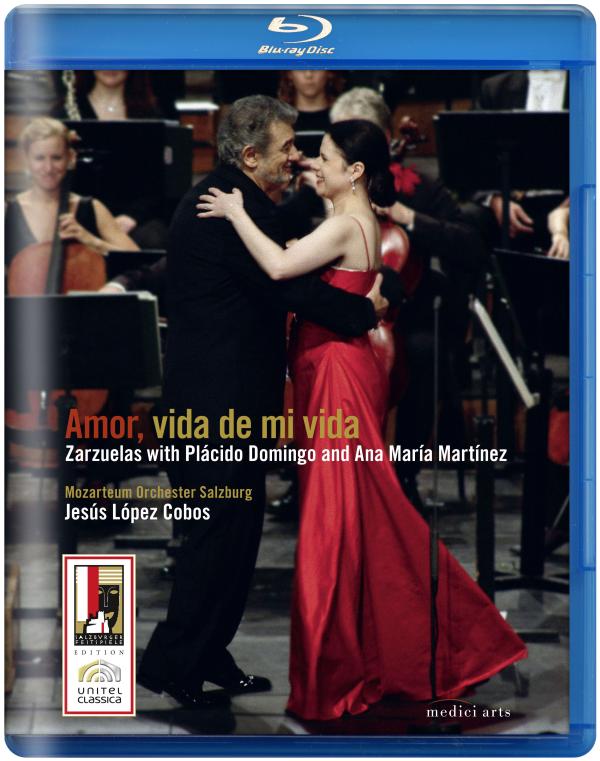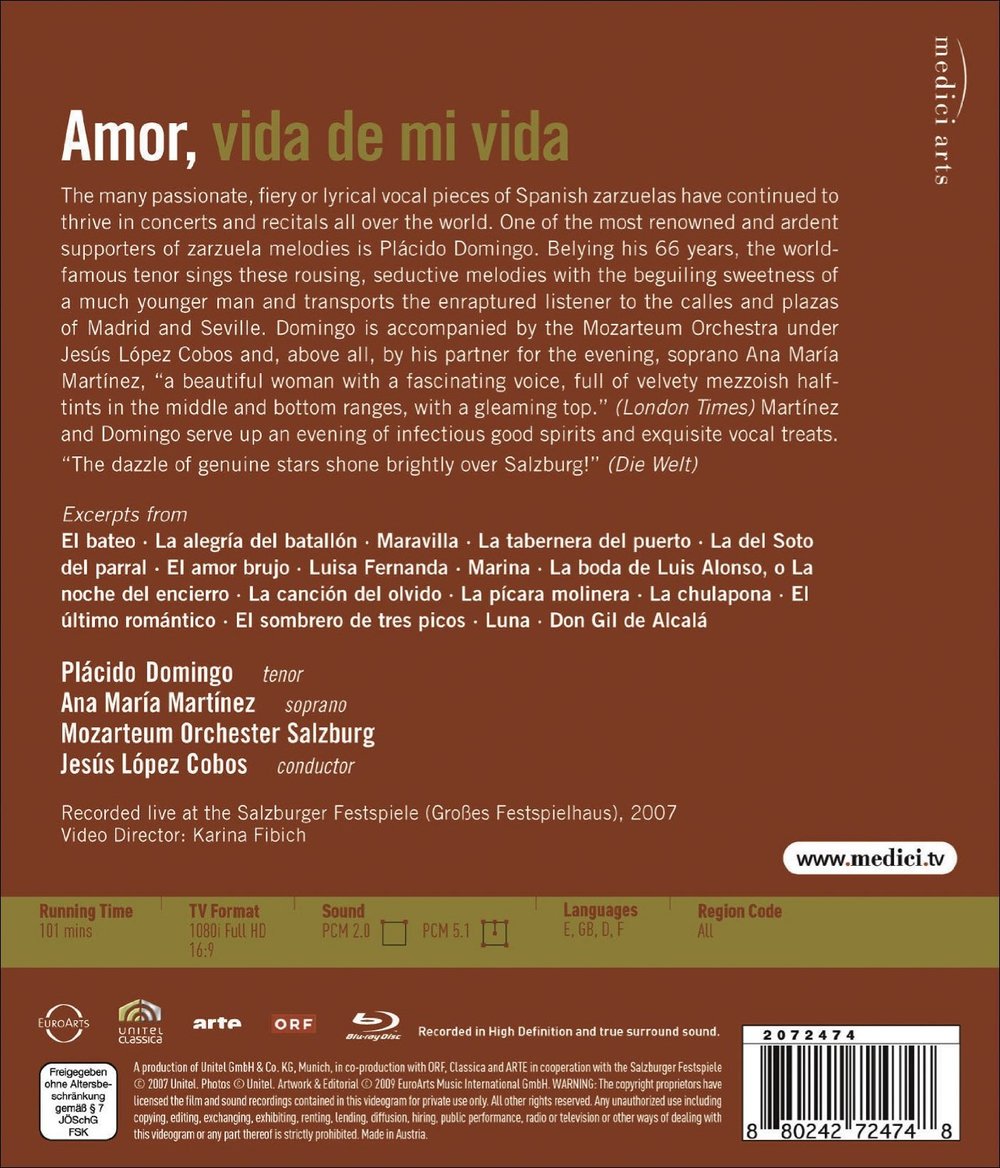

Amor, vida de mi vida concert. Plácido Domingo and Ana María Martínez sing zaruelas. In 2007, Jesús López Cobos conducts the Mozarteum Orchestra Salzburg at the Großes Festspielhaus as part of the Salzburg Festival. Here are the selections:
Frederico Chueca Preludio to El bateo
Frederico Moreno Torroba "Amor, vida be me vida" from La Maravilla
Pablo Luna Carné "De España vengo" from El niño judío
Frederico Moreno Torroba "Tienes razón, amigo" from La chulapona
Frederico Moreno Torroba "Tres horas antes del día" from La marchenara
Manuel de Falla Danza ritual del fuego from El amor brujo
Frederico Moreno Torroba "¡Cállate, corazón!" from Luisa Fernanda
José Serrano "Qué te importa que no venga?" form Los claveles
Reveriano Soutullo Otero "Quiero desterrar de tu pecho el temor" from La del Soto del Parral
Jerónimo Giménez Bellido Interludio from La boda de Luis Alonso, o La noche del encierro
Manuel Penella "Todas las mañanitas" from Don Gil de Alcalá
Pablo Sorozábal "En un país de fábula" from La tabernera del puerto
Frederico Moreno Torroba "Luché la fe por el triunfo" from Luisa Fernanda
Manuel de Falla Jota from El sombrero de tres picos
José Serrano "Junto al puente de la peña" from La canción de olvido
Ruperto Chapí "Al pensar en el dueño de mis amores" from Las hijas del Zebedeo
Frederico Moreno Torroba "En mi tierra extremeña" from Luisa Fernanda
Pablo Sorozábal "No puede ser" from La tabernera del puerto
Ernesto Lecuona "Mulata infeliz, tu vida acabó" from María la O
Manuel Penella "¡Soleá!" -- "¿Me llamabas, Rafaeliyo?" from El gato montés
Franz Léhar "Lippen schweigen" from Die lustige Witwe
Directed for TV by Karina Fibich. Sung in Spanish. Released 2009, disc has 5.1 PCM sound. Grade: B+
Zarzuelas are Spanish operas written over four centuries in a variety of forms and styles. According to Christopher Webber, probably the leading authority on zarzuela in the Anglosphere, these operas have dealt with all social classes. I get the impression that the zarzuelas differ from the operas of other European countries by often or typically having more drama-theater spoken lines. (In this concert title you will not, of course, hear any spoken dialog.)
"Zarzuela" does not refer to an individual song; each number from a zarzuela will have a name like "romanza" or "cancion." The songs can be about most anything. But the ones that have made the biggest impression on me are about poor girls with broken hearts.
Plácido Domingo was age 66 in 2007 when this HDVD was recorded. He was born in Spain, but he grew up in Mexico where his parents had a zarzuela company. So Domingo was a zarzuela pro who later broke into opera. Ana María Martínez, age 36 in 2007, was born in Puerto Rico of Hispanic parents. She enjoyed classical opera training at Julliard. She started her singing career with the Houston Grand Opera, and is today one of the top opera sopranos in the world. (There's a wonderful cover article about her in the October 2014 Opera News.) Her appearance and Spanish mother tongue also give Martínez a special affinity to zarzuela.
When the folks at Salzburg decided to do a concert featuring songs from zarzuelas, Domingo and Martínez were the zarzuela dream-team. This was probably a new experience for the Mozarteum Orchestra Salzburg, and Jesús López Cobos was an inspired choice of guest conductors. The 21 numbers on the program included 4 orchestra pieces, 5 solos for Domingo, 5 solos for Martínez, and 5 duets for both.
Our first screen shot shows the orchestra in the opening number, the Frederico Chueca Preludio to El bateo. 2007 was early in the history of HDVD, and the picture quality is a bit soft. Because the orchestra is mid-sized, TV director Karina Fibich is able to give us many pleasant whole-orchestra and part-orchestra views such as this one:
She also gives us excellent section shots such as this one of the double-bass section:
On the other hand, the pace of the cuts is a bit hyper. There is pointless panning and zooming, some field-of-focus issues, and too many instrument-only shots such as this one:
And there are too many shots over the backs of musicians as seen below. For more on what one should and should not do in making an HDVD of a symphony orchestra, see our special article on standards for shooting symphony videos. This explains the the dread disease of DVDitis, a malady that afflicts HDVDs that are not made properly to take full advantage of HD cameras:
Fortunately, the symptoms of DVDitis are usually mitigated substantially in recordings of recital concerts. Here's a shot of Domingo singing his solo which provides the name of this HDVD. The English translation for these lines this would be "Love, life of my life, how sad it is to say good-bye."
Domingo is excellent in this HDVD; but Martínez, with her youth and glamour, runs away with your attention. Here, from El niño judío, she laments to her Gypsy lover, "I'm from Spain":
"My Gypsy boy, I love you but you don't love me!"
Included are two selections from the most famous zarzuela opera, Luisa Fernanda. Luisa has to chose between two handsome men. Javier, her first love, is a dashing but poor army officer who abandons her but, just in time, returns purified by defeat and remorse. Vidal is a conservative and wealthy farmer who courts her offering comfort and security. Here, early in the show, she tells Vidal that she loves another. Vidal replies, "Across a river of rejection, I throw up a bridge of hope."
And here we see Luisa sending Javier away even though she admits that "against my will, I shall always love you." But this isn't the end of the story. What does Luisa finally do? Well, check out the HDVD Luisa Fernanda to see:
Here's a happy love song that begins with "Every day starts with the dawn" and ends with a kiss:
The saddest song is the Martínez solo, María la O. The music is exotic, seductive, sexy, and enticing. But imposed on it are the words of a crushing lament of loss, despair, desire for revenge, and dreams of death. Here María sings, "Unhappy mulata, your life is finished" or maybe "Poor mulata, you're through."
"María la O, now your lover is gone:"
The mostly German-speaking Salzburg audience was enchanted with Ana and Plácido throughout this generous show. But the final encore (which has nothing to do with zarzuelas) "Lippen schweigen" from Die Lustige Witwe ("Lips be quiet" from The Merry Widow) brought them to their feet. The orchestra players were grinning too, as you can see in the last 5 screenshots from this rendition of the famous Léhar waltz.
Plácido sings, "Lips be silent, the violins whisper" or, to try for a rhyme in English, "Lips be still, let the violins thrill":
"Love me":
"With each step of the waltz, my soul dances too" or maybe, "With each step to the song, my soul dances along":
"And I love you so much", or maybe, "Be mine, be mine? I'm thine, I'm thine."
The show ends with the waltzing lovers:
Zarzuelas belong to a genre about which I was completely ignorant until this HDVD came along. Because HDVD allows all fine-art programs to be portrayed more beautifully than before, it can elevate something that you once ignored into something that demands your attention. For more on zarzuelas, check out Luisa Fernanda. And on Track 11 of the Baden-Baden Opera Gala Concert, Elīna Garanča sings a fabulous zarzuela song from the Chapí Las hijas del Zebedeo. To learn still more, see Christopher Webber's website www.zarzuela.net. (Please let me know if this link ever gets broken!)
Now for a grade. The orchestra plays fairly well considering that most of the music probably was new to the musicians. SQ is slightly cramped and dull as to the orchestra---not too surprising for an HDVD from 2007. As mentioned, PQ is a bit soft and there are motion artifacts that should have been avoided. The video content for the orchestra selections has an irritating if mild case of DVDitis; video content for the selections with the singers is fine. I originally gave this a "B" in 2009. But I enjoy this more each time I see it, and I'm moving the grade up to "B+."

















